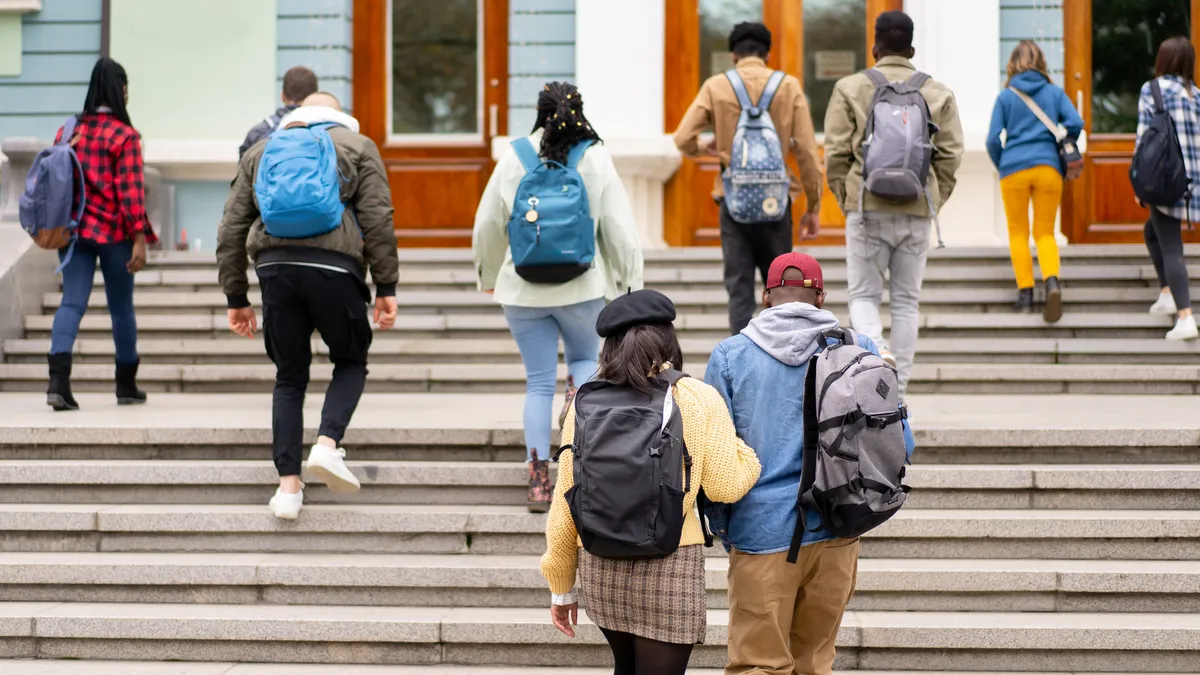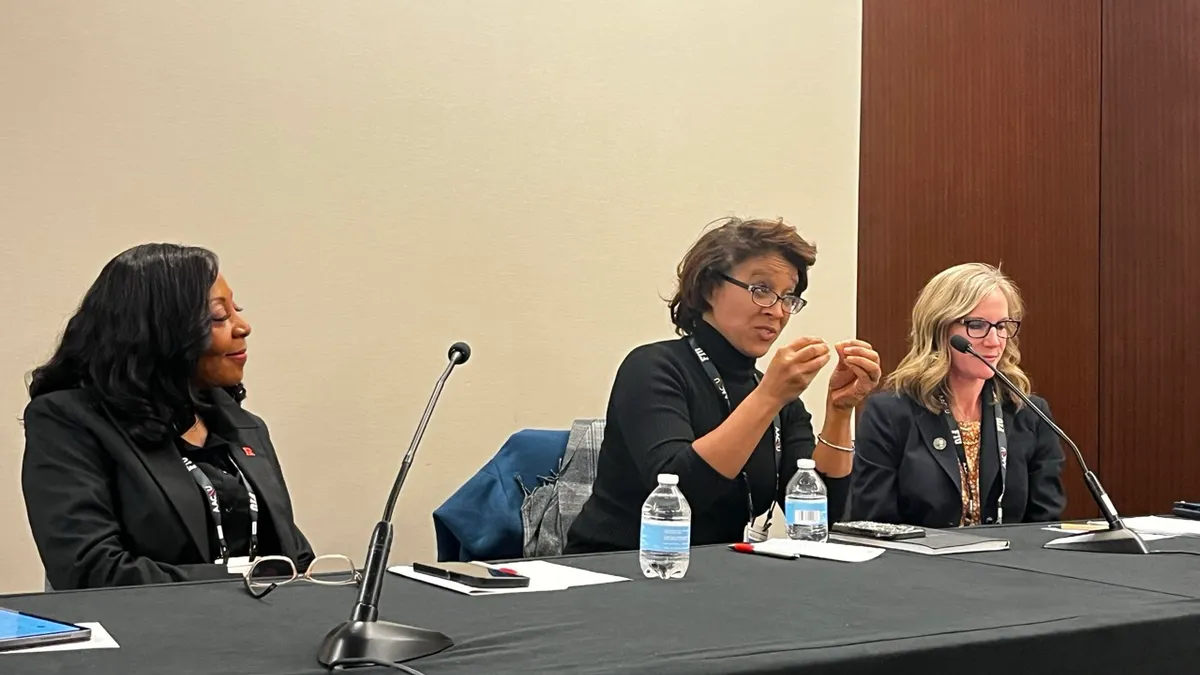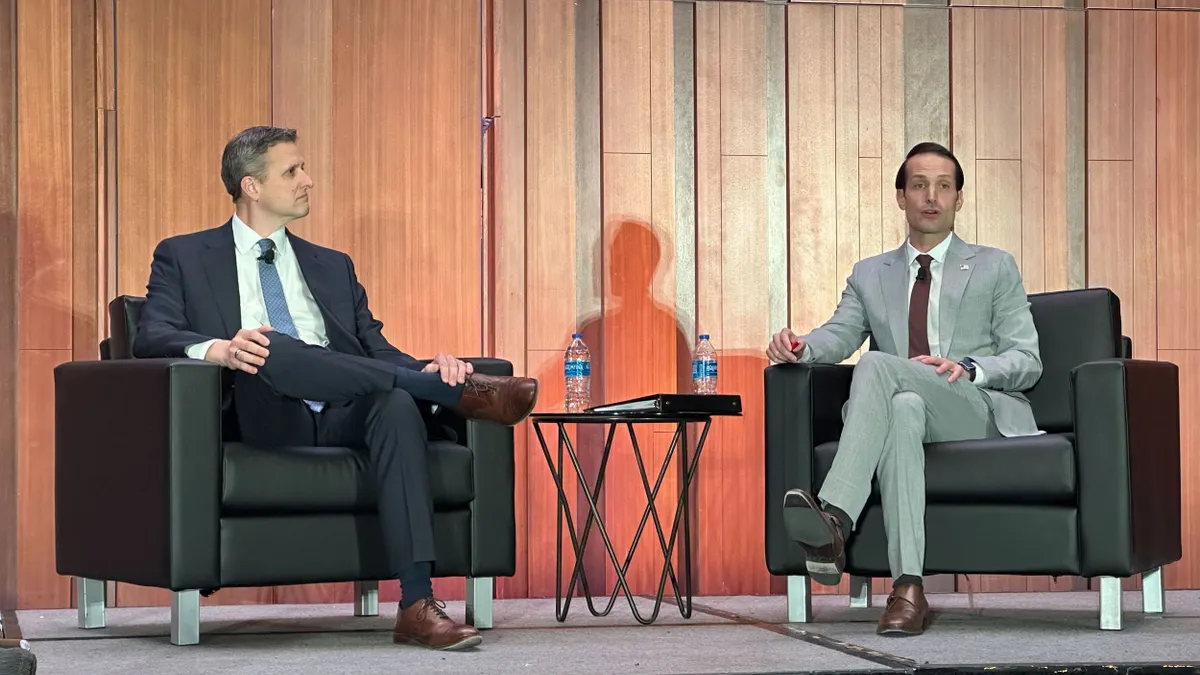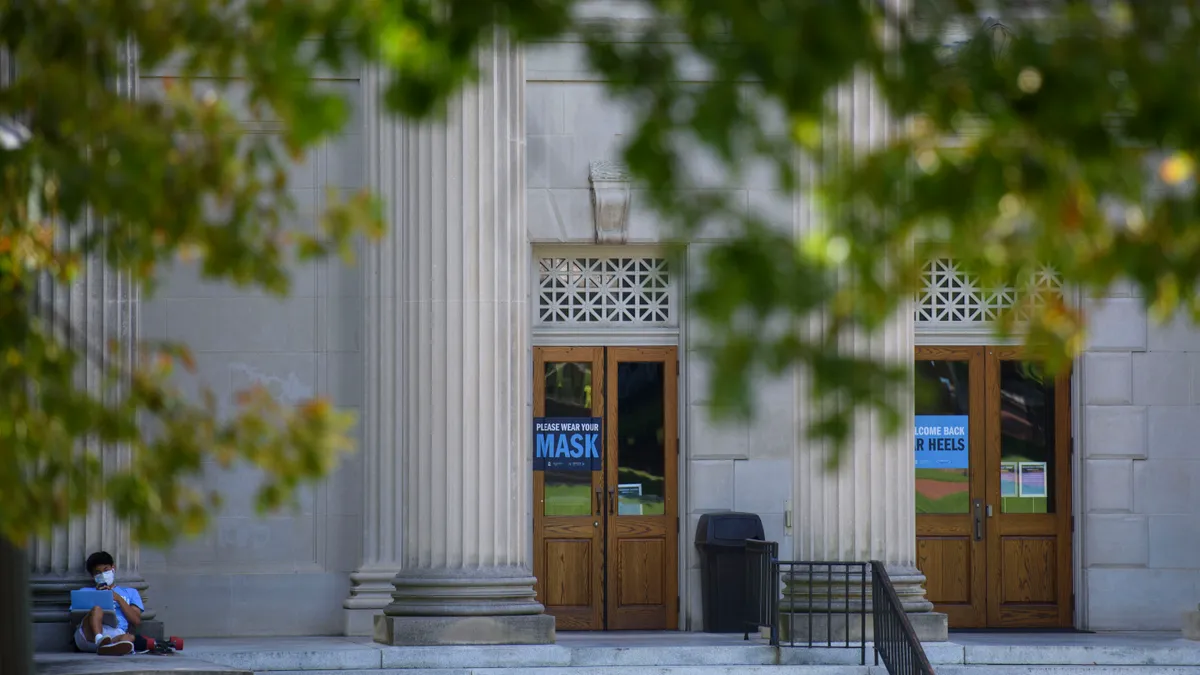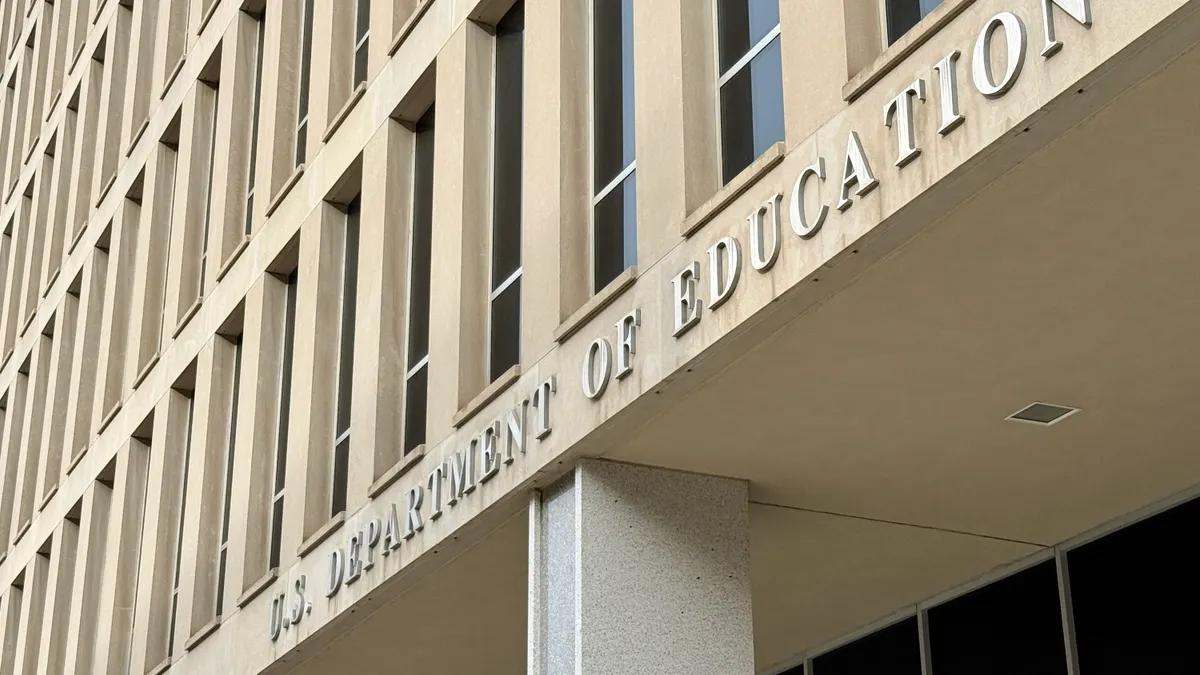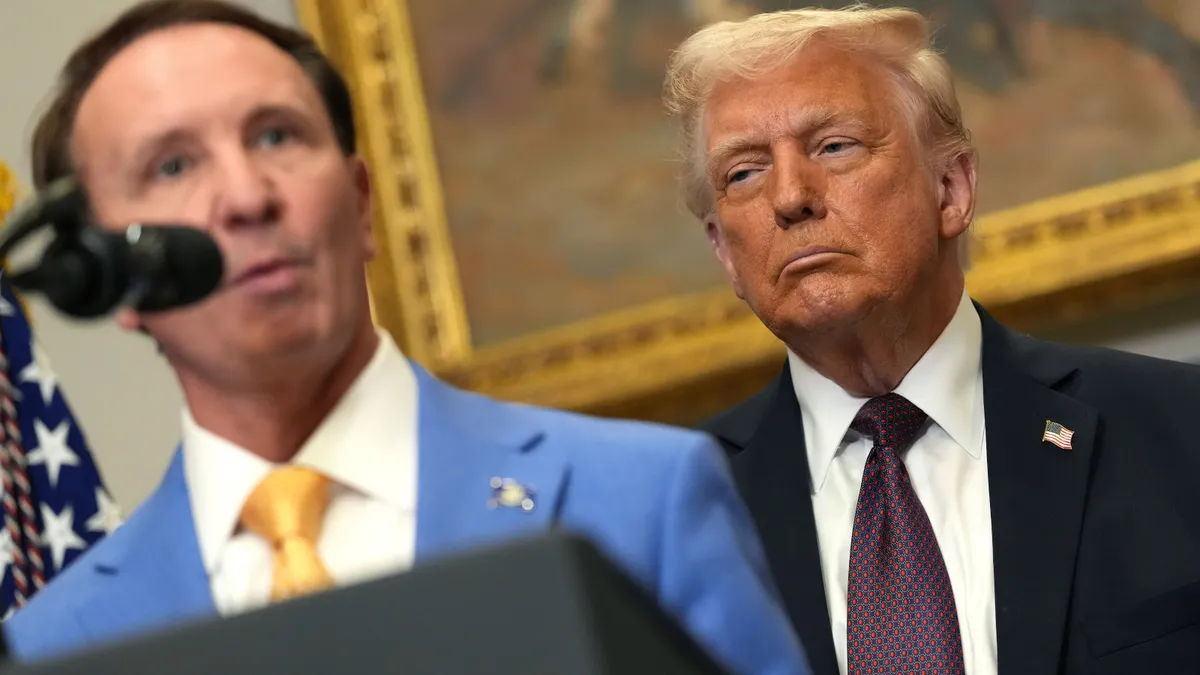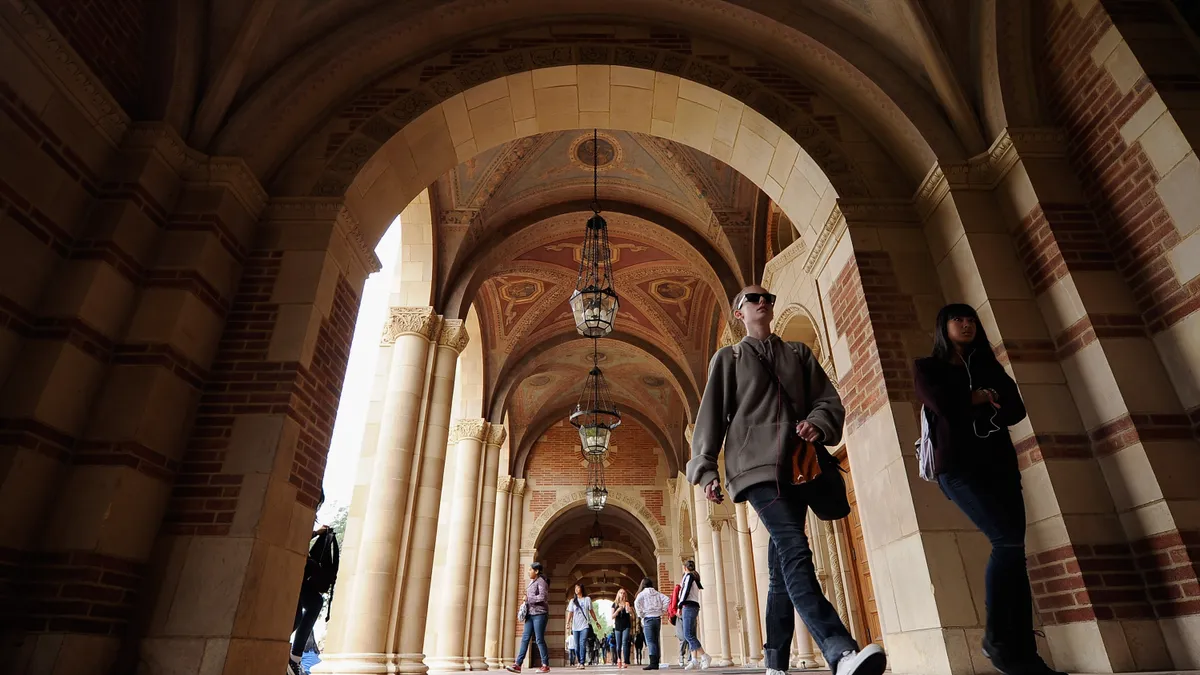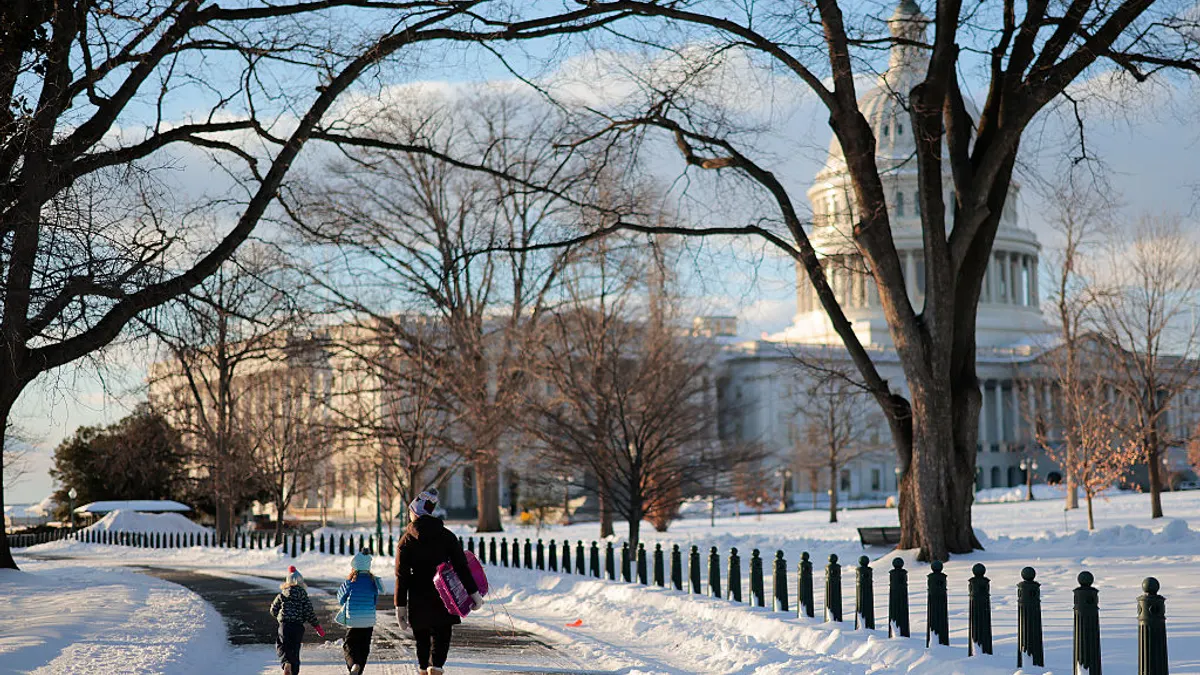This year has already brought big challenges to the higher education sector, from major shifts in federal policy to massive cuts in government research funding.
As college leaders gear up for the 2025-26 academic year, they’re staring down even more change ahead.
The U.S. Department of Education is undertaking massive regulatory changes, the Trump administration is ramping up investigations into colleges, and Republican lawmakers are continuing their crackdown on diversity, equity and inclusion.
Below, we’re rounding up six trends we’re keeping tabs on.
Trump and Republicans usher in a new era of financial retrenchment
Last year, colleges slashed spending on staff, faculty, programs and more in response to difficult enrollment realities and rising costs. The budget pressures have only intensified for many in the higher education world since President Donald Trump took office in January.
The Trump administration has targeted about $3.3 billion in grant funding for termination at public and private universities nationwide — about $206 per student — according to an analysis by the Center for American Progress.
In addition to contractions in research spending, institutions are juggling myriad changes to federal policy by Trump and congressional Republicans that could have significant effects on institutional budget planning. This includes a more fraught environment for international students, cuts to federal student lending and a higher endowment tax, to name just a few.
As they brace for a painful new era of higher ed, institutions of all kinds — from Stanford University to the University of Nebraska — are freezing hiring, offering buyouts, laying off faculty and staff, and pulling back on capital projects.
The new legal minefield
The Trump administration’s legal and financial warfare against Harvard University has grabbed an outsized share of headlines, and arguably for good reason. Harvard is the richest and oldest college in the U.S. If the administration succeeds in a multi-agency, omnidirectional attack on the institution, where does that leave the rest of the nation’s colleges?
Facing this question, some institutions have already made deals with the Trump administration as they attempt to maintain their federal funding and stay out of legal battles. Others are reported or confirmed to be in negotiations with the federal government. And many colleges are facing a difficult balancing act between mission and compliance.
In its attacks on colleges, the Trump administration has introduced novel and aggressive readings of civil rights laws and U.S. Supreme Court cases, as well as threatened vast sums of funding for colleges it considers out of compliance with federal statute.
For instance, the Education Department deemed the University of Pennsylvania in violation of civil rights law for prior policies allowing transgender women to play on sports teams aligning with their gender identity. Penn became one of the first colleges to strike a deal with the administration rather than risk the sort of multi-agency attack — complete with prolonged litigation — being deployed against Harvard.
Meanwhile, federal agencies suspended nearly $600 million in funding from the University of California, Los Angeles over allegations that it violated civil rights law because it didn’t do enough to respond to a pro-Palestinian protest encampment on its campus in spring 2024. Police cleared the encampment at the university’s request after less than a week.
Among other legal risks under Trump, policies meant to support transgender students or diversity programs can now potentially prompt prosecution of a college under the False Claims Act, a federal law dealing with fraud in government contracting. That’s according to a May message from Deputy Attorney General Todd Blanche introducing the Civil Rights Fraud Initiative that specifically listed colleges as potential False Claims Act targets.
New regulations coming down the pike
The Education Department has its work cut out for it over the next year. That’s because the agency must craft regulations to carry out the higher education-related provisions of the sweeping domestic policy bill passed by Republican lawmakers this summer.
The changes under the One Big Beautiful Bill Act — which has been slammed by many higher education advocates — are vast.
They include phasing out Grad PLUS loans, which allow graduate and professional students to borrow up to the cost of their college attendance. The legislation also caps lifetime borrowing limits at $100,000 for most graduate students and $200,000 for those pursuing professional degrees, and it will consolidate a handful of repayment plans into just two options. And it opens up Pell Grants to programs as short as eight weeks.
Colleges will also face new regulations.
Under the legislation, their programs will lose federal student loan eligibility if they can’t prove their students get an earnings boost. For undergraduate programs, that means showing that at least half their graduates earn more than workers with only a high school diploma in their state.
The Education Department is devising the new regulations through a process called negotiated rulemaking. Under this process, the agency convenes representatives who will be impacted by the regulations — such as colleges, student loan borrowers and state officials — to hash out policy details.
If they agree on language, the Education Department is largely bound to adopt their rules as written for its regulatory proposal. If they don’t, however, the agency is free to come up with its own regulations.
The Education Department kicked off the process earlier this month and will hold meetings with negotiated rulemaking committees through January.
A shifting landscape for federal research funding
Legal battles over threatened federal research funding are likely to heat up in the months ahead.
Under the Trump administration, at least four major federal agencies have announced plans to cap reimbursement for indirect research costs — which support expenses like laboratory and facilities maintenance — at 15% for colleges. Many major research universities have negotiated rates hovering around 50% to 60%, meaning these policies threaten vast sums of their federal research funding.
So far, courts have blocked or paused each of the caps. The Trump administration has appealed three of the rulings, and one case is still playing out in federal district court.
Meanwhile, the Supreme Court recently dealt a major blow to research universities by pausing a lower court order that would have restored $783 million in cut funding from the National Institutes of Health under the agency’s anti-DEI policy. While the high court preserved the ruling against the anti-DEI directives, it said the plaintiffs would have to pursue their claims to restore the cut grant funding in the U.S. Court of Federal Claims, which hears monetary claims against the federal government.
Massachusetts Attorney General Andrea Campbell, who has led a coalition of states suing over the NIH cuts, indicated in a statement that the fight was not over.
“Even if accountability is delayed, we won’t stop fighting to protect this funding, our residents, and our rule of law,” Campbell said.
The battle over in-state tuition for undocumented students
At least 25 states and Washington, D.C., started the year with policies allowing eligible undocumented students to pay in-state rates at some or all of their public colleges. But since Trump began his second term, Republicans and his administration have prioritized reducing undocumented students’ access to higher education.
Florida first spurred the shift during a January special legislative session, repealing a law that made certain undocumented students eligible for in-state tuition rates at its public colleges.
Then, following an executive order from Trump, the U.S. Department of Justice sued Texas in June over its decades-old law — the first of its kind in the country — making undocumented students eligible for in-state tuition if they meet certain residency criteria and other requirements.
Despite the attack on the state statute, officials within Texas’ attorney general’s office quickly sided with the DOJ and filed a joint motion with the Trump administration to end the policy. A federal judge overseeing the case struck down the law only hours after the DOJ first filed its lawsuit.
Texas' cooperation gave the Trump administration an early win and an example to cite as precedent as it moved on to target less amenable states.
U.S. Attorney General Pam Bondi has since filed lawsuits in rapid succession against Minnesota, Oklahoma and Kentucky over their in-state tuition policies for undocumented students. Like Texas, Oklahoma leaders partnered with the DOJ and filed a joint motion to end its policy. The request has not yet been approved by a federal judge.
Bondi argued in multiple, nearly identical statements that in-state tuition rates for undocumented students illegally provide benefits not offered to all U.S. citizens. One higher education attorney has argued that the Texas policy has the same requirements for participation for U.S. citizens and undocumented residents.
The American Civil Liberties Union of Texas and other groups have sought to intervene in the state's case and asked a federal court to set aside the order declaring Texas’ in-state tuition policy unconstitutional. The same federal judge that struck down the law ruled against them earlier this month, though the groups have already appealed.
Enforcement of new DEI restrictions
For years, conservatives have led coordinated efforts to eliminate diversity, equity and inclusion efforts in higher education. The campaign only grew following Trump's return to office and his administration's push to crack down on diversity initiatives.
To comply with new federal directives and state laws, colleges have sprinted to cut programs, cancel events, restructure student services and reassign or lay off DEI-focused employees. In Ohio and Kentucky — two of the most recent states to enact DEI bans at public colleges — some higher education leaders read the writing on the wall and began cutting DEI work prior to the new laws' passage.
Colleges are now being increasingly singled out for alleged violations of DEI bans. One method is through secretly recorded and heavily edited videos of employees. The videos, shared online and via conservative media outlets, appear to depict college officials talking about how to avoid DEI restrictions.
The dean of students at the University of North Carolina Asheville is "no longer employed" there after one such recording went viral, according to a university official. And in the same state, Western Carolina University announced it would close its Office of Intercultural Affairs, following a widely-shared video of a former employee who suggested DEI work be embedded across campus.
Two of Iowa's three public universities — the University of Iowa and Iowa State University — are under state scrutiny after similar videos surfaced of their staff. The state attorney general is investigating the incidents at the University of Iowa at the behest of Iowa's governor.
Two University of Iowa employees have been put on leave, with the Republican chair of the Legislature’s House higher education committee calling for them to be fired. Iowa State University told local media outlets that a video showing one of its administrators discussing DEI work appeared to be filmed a year prior to its release and featured a former employee who had not worked there since 2024.
GOP lawmakers from conservative-led states have also been calling on the Trump administration to investigate colleges over their DEI efforts.
In Texas, a Republican state representative requested the Trump administration to investigate Texas A&M University over allegations the institution "engaged in DEI courses and discriminatory 'targeted recruiting' practices."
Two states over, a congressional representative from Tennessee similarly called for a federal investigation into Belmont University, alleging the private Christian college's restructuring of its DEI office was "an intentional effort to deceive federal authorities and continue promoting discriminatory programming under a new name."
Some colleges — particularly public ones in conservative states — are cracking down on behavior that could draw lawmaker attention.
Tarrant County College, in Texas, fired two administrators over the inclusion of DEI content in a mandatory training video, according to The Collegian, the institution's student newspaper.
The community college also disciplined two employees over DEI-related offensives — one for conducting a workshop on "Microaggressions & Mental Health" and the other for gifting women co-workers a bouquet of flowers with a "Happy International Women’s Day” card.

